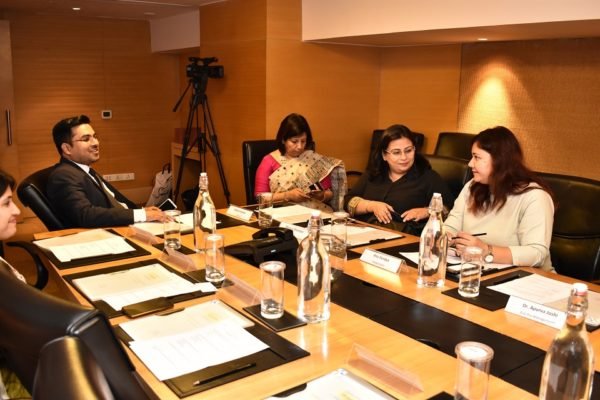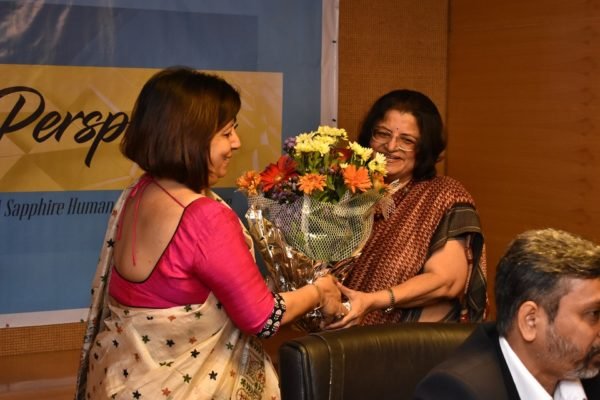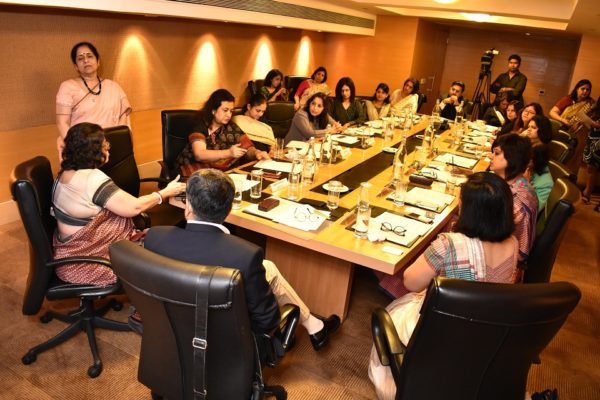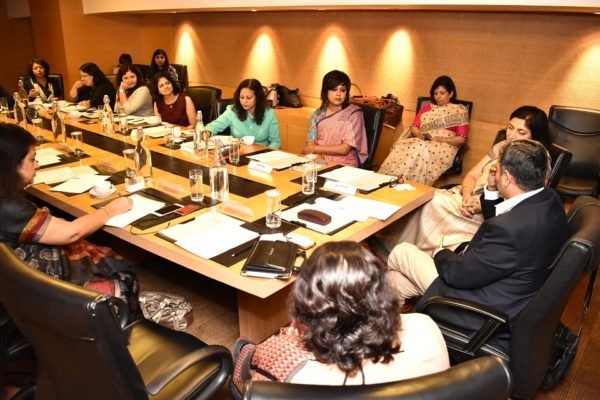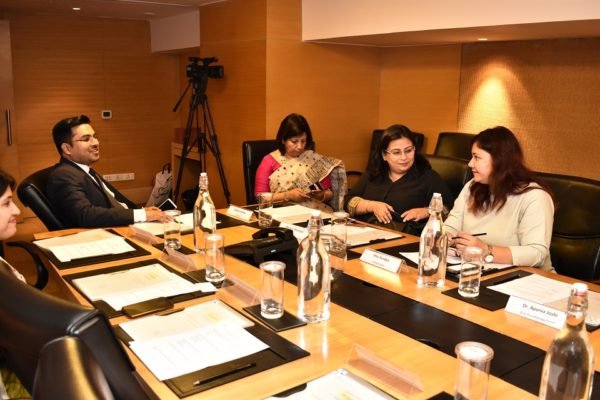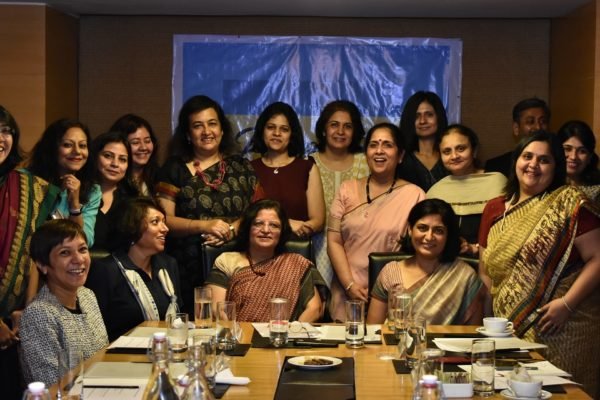Women in the Boardroom
October 4, 2018
4th October 2018, Mumbai | Speaker : Sudha Ravi and Apurva Purohit
The third session of Perspective, a unique initiative by Sapphire Human Solutions, was a panel discussion, the objective of which was to spark a dialogue about women stepping into the Boardrooms amongst a close group of senior women from the industry. The panel comprised of Ms. Apurva Purohit, President of the Jagran Group, one of India’s largest multi-media conglomerates and Ms. Sudha Ravi, presently with Ajay Piramal Group Company, Piramal Capital & Housing Finance Ltd. The session was moderated by Mr. Utkarsh Patel, who wears many hats and a regular with Perspective.
The session began with the moderator giving the rationale of Perspective and its relevance to the corporate world. After the initial introductions and felicitations of the panelists, the moderator went on to mention how according to SEBI, it was now imperative that the Board of Directors, of listed companies appoint at least one woman director. The deadline for this is April 1, 2019 for the Top-500 listed companies and April 1, 2020 for the Top-1000 listed companies. After giving the scenario of the state of women in the boardrooms, both in India and abroad, Ms. Purohit was asked if she could explain the reluctance of ‘allowing’ women in the Boards of organizations. According to Ms. Purohit, more than the reluctance of people to get women in the Boards, it was more so because there weren’t too many women around at that level. Further, she added, that this was also the case as the present board members preferred ‘one of them’ in the boards as against someone they don’t know well. However, she did not feel that this had anything to do with gender-discrimination. Ms. Purohit also felt that the lack of women in the Boardrooms had less to do with the issue of gender-diversity. She felt that it was really strange that in a country which has 50% women, we are still focusing on gender as a factor in the diversity discussions, when there are many other aspects to be taken into consideration.
Ms. Ravi was asked if this need to take women in the Board piece-meal did amount to anything important or was it just a tick-in-the-box for the organizations. Ms. Ravi narrated her own experience when she was inducted in a particular Board. She felt that if women are inducted in the Boards, then they ought to be done for their individual merit and skills. However, she was also of the opinion that women are partly responsible for relegating themselves in the sidelines of a Board and seldom making a difference. She felt that women too need to seek help, speak up and make their presence felt and not hesitate.
It was felt by Ms. Ravi, that while there was no dearth of knowledge and skills in women, one of the prime reasons for women not being on Boards is their lack of effort. She felt that women need to network more than what they do. She felt that networking helped in visibility and the awareness of the fact that one was interested in such roles. While there does exist a ‘boys-club’, India according to Ms. Ravi has moved beyond networking at such levels.
Quoting a report which said that women were never given much authority and power in a Board, the moderator asked for Ms. Purohit’s opinion on the same. Ms. Purohit, however, was of the opinion, that authority was never ‘given’, it had to be ‘taken’. She also added that often women do not assert themselves and claim the space that is theirs and thus end up being a non-participating member of the Board. She felt that while it is tough to assert in a board where women are a minority, the effort should never cease. Ms. Ravi added that it was important for women also, to understand the dynamics of the said business and the boards and then make decisive moves and contributions. If this is done effectively, there is no underestimating your position in the Board. Both the panelists were of the opinion that it was important to be assertive about their selves and do that with much confidence. Ms. Ravi also added that it was imperative on every person, to equip themselves with the jargons and nuances of the industry, asoften the Board members might not belong to the same industry, especially the Independent Director. Every industry has its own processes and peculiarities which must be understood, both to understand the proceedings of the meetings and to make significant contributions.
Keeping in mind the fact that many of the participants were those who were aspiring to take board positions in the future, Ms. Ravi was asked of the factors to keep in mind to get there. To this Ms. Ravi replied that it was important to each of them to first decide, if one really wanted to take such positions, as the roles call for a lot of involvement and action, besides ones regular work. If one is not willing to give 100%, then one might as well not take the responsibility. Identify ones skill-sets and match them with the boards, which require such skills and network to ensure that one is able to join relevant boards. Staying abreast with the regulatory framework is imperative. Ms. Purohit too harped on the importance of networking in her remarks.
On asking if women faced any challenges as a Board member, Ms. Purohit said that the first challenge is that a woman’s voice is seldom heard, which of course had to be overcome with patience. Ms. Ravi added that often women were a challenge to themselves. Often women did not make that effort to be heard too. Ms. Ritu Anand, a participant added that in modern times, one should harness the power of social media to network. One really didn’t need people to push you, one could do it all by oneself. She also felt that one of the important reasons why women are not on the Boards is because they have not expressed their desire to do so, often due to ignorance or inclination.
Both Ms. Purohit and Ms. Anand felt that the last three years have however, seen significant change in the initiatives taken by women. However, Ms. Purohit did hint at the bias in the sub-consciousness of the men towards their own women personnel, added to the fact that the said women too were not volunteering for the positions. This leads to a Catch-22 situation. Ms. Dipali, a participant with HR background said that she had often come across women who undermine their potential as against men, who overestimate their potential for a given profile within the organization. According to her, women were much more conservative in self-evaluation as against men. This self-undervaluing was a major undoing for women.
A general feeling was that if one is confident and knowledgeable, then people actually ‘lean-on-you’ for support or advice. It’s for the individual to prove ones worth in a Board. The fear of failing is one of the major inhibitors of women members, unlike men. One of them mentioned that women tend to ‘agonize over their mistakes’ much more than men and that ought to change.
At this juncture, Dr. Ranjana Pathak felt that the gathering was too harsh on women, by speaking about their weaknesses. According to her, it would be worthwhile to speak about the strengths of the women and what difference they do make in both the workplace and the Board. She added that it was the responsibility of the women, to enable other women to come up and express themselves. Ms. Purohit agreed that it was important that women board members recommend other women for the Board provided they fit the bill. They should be the inspirations for the younger women.
Ms. Ritu Pandya felt that women need to recognize their importance and work on their terms and deliver. It was important to assert their selves in a positive way.
Ms. Ravi harped on the importance of coaching by the Independent Director. She was of the opinion that despite efficient leadership and the experience behind them, an organization can fail. An Independent director can be a great mentor and coach in such situations. She felt that as an Independent director, it had nothing to do with man or woman. It was about responsibility and efficiency.
Ms. Anand wanted to know form the panelists, how could a transactional level discussion at a Board meeting be changed to a strategic level discussion. Ms. Ravi cited an example that if the board meeting was just going through results in terms of numbers, she intervened to ask about its change in comparison to earlier numbers or seek projection details. According to her an independent director is the ‘conscience for the rest of the company’ and it is her responsibility to get answers. If certain skill is not ones forte, then there is no harm in learning about it. At that level, it was detrimental to know nothing about an important function of the organization. Seek clarifications of regulatory matters and stay abreast. Ms. Purohit added that compliance and regulatory aspects take so much of time of the Board, that strategy often gets left out. She suggested that it would be important to suggest a separate strategy meeting where only strategy would get discussed. The independent director has a lot to contribute to that. Also, it would be a good practice to set time-limits to be spent on strategy and others and measure that during the meets. Further, ensure that there is a mechanism to put metrics in place to stop deviations for laid down norms. She also harped on the significance of Board Evaluations.
Mr. Ankit Bansal, explained how during his research on the subject he found many to have reservations to the idea of women directors. According to him, there was no data on Indian companies gaining from this diversity in the Boards. All the studies and data relate to global organizations. He suggested that the independent women directors should put together some data to show the efficacy of the women’s participation in the Board. Ms. Purohit agreed with the need to conduct such study, as lack of data was a major roadblock in our country. However, she added that whatever little data was available was seldom used. Mr. Bansal also wanted to know if there was a gender-wage gap at the Board level. Ms. Anand explained that this was a complex issue, but hoped that the anomaly would even out soon. It was observed that on a role-to-role basis there was no gap, but on the whole due to lesser number of women, it did seem so.
A change in the mindsets of men is required to ensure that more women join and participate. Mr. Bansal brought out the aspect of ‘blind-spots’ that men have regarding women and the need to remove the spots. However, Ms. Purohit added, that biases were not the domain of men only; even women had their own biases, which need to be corrected.
The discussion concluded by expressing hope that there was going to be no gender-bias at the Board level, and it won’t be too long when there would be a fifty-fifty ratio of men and women at the Board. The session ended with a vote of thanks to the two esteemed panelists by the Moderator.
Photo Gallery
